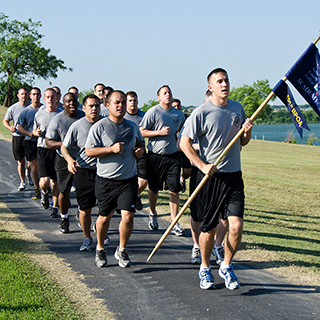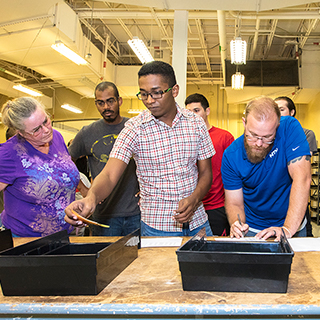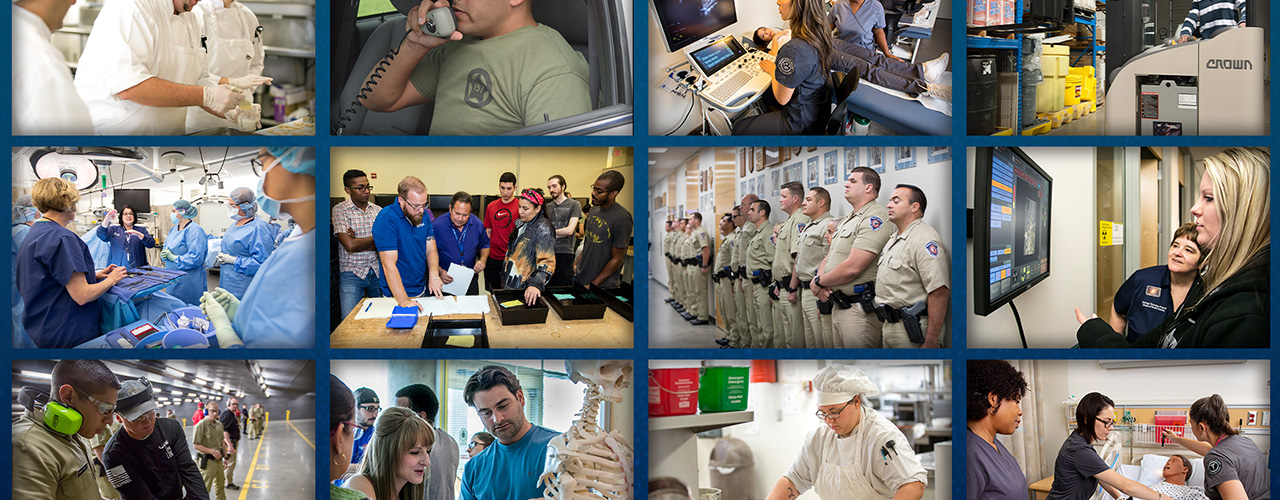The Essentials of Being Essential
Preparing for the New Normal
The economic uncertainty unleashed by the Coronavirus pandemic continues to devastate the work world in ways that were unthinkable at the beginning of the year. American jobless rates have skyrocketed to levels unseen since the Great Depression. Many industries are struggling to regain a sense of normalcy amid confusion about when and how to ensure safe reopenings.
The big question: What does “essential” employment look like, both during COVID-19 and the eventual post-crisis recovery? Will a jobseeker’s current skills be enough, or will new occupations call for additional training?
“Many answers will depend on the progression of the global pandemic and the response of consumers, businesses and governments,” says Judith Gallagher, vice president for academic affairs at TCC Northwest. “And while we don’t know how long this will last, there are opportunities for those willing to adapt current skills or learn new ones. And it doesn’t take years.”
Say “hello” to TCC’s CTE (Career and Technical Education) offerings. More than 40 of TCC’s 100-plus programs take 12 months or fewer to achieve certification and credentialing, both online and in learning environments that conform to CDC and OSHA safety recommendations.
Let’s look at how several CTE programs are helping workers get from under-employed to “essential” in record time.
Health Care
The U.S. Bureau of Labor Statistics estimates that health care accounts for about 11 percent of the economy and will grow 14 percent from 2018 to 2028, much faster than the average for all occupations. That translates into nearly 1.9 million new jobs, more than any other occupational group.
“Health care is an essential, dynamic and opportunity-rich industry with virtually unlimited opportunity,” says Joseph Cameron, dean of health sciences at TCC Trinity River Campus East. “Demand for improved outcomes, affordability, quality and access will continue to be high. We’re really helping make a powerful difference in people’s lives.”
Making a difference is at the core of TCC’s 34 health care training programs. Specialties include dietician, dental hygiene, anesthesia technology, sonography, nursing, nuclear medicine, tomography and much more.
For those looking for a fast start, the Certified Medical Assistant (CMA) program is the way to go.

“Medical assistants crosstrain in both administrative and clinical duties,” says Miguel Gonzalez, medical assistant program director. “The work includes scheduling appointments, updating and filing patient medical records, coding insurance forms, taking medical histories, explaining treatment procedures, performing basic lab tests, even drawing blood and taking electrocardiograms, among many other functions. It makes for a busy and fulfilling day.”
Admission requirements are simple: a high school diploma or GED, prior CPR training and vaccination records. The program accepts about 30 applicants each year and requires a nine-month commitment, from fall to spring. Training includes both online classroom instruction and face-to-face lab work (done under strict CDC guidelines). Classes are held Friday through Sunday, with two days per week dedicated to clinical internships, over a 20-week period.
Along with providing instruction, Gonzalez coordinates clinical experience internships for students at one of nearly 30 partner organizations, including JPS, Clinicas Mi Doctor locations, North Texas Area Community Health Centers and other local facilities. He adds that medical assistant jobs pay around $16 to $19 an hour and sometimes more, depending on experience.
“The program helped me get into the medical field quickly,” says Krystal Shelton, a CMA at AFC Urgent Care in Southlake. “So quickly, in fact, that I was hired during my clinical rotation! I’m now also performing electrocardiograms and phlebotomy. I’m really thankful to have been part of the program.”
“The TCC medical assistant students are well trained, enthusiastic and extremely helpful at our clinic and especially to our patients,” says Lori Kennedy, health services director at Fort Worth’s Cornerstone Assistance Network. “We’re glad and grateful to have them here.”
“Employment prospects are outstanding,” Gonzalez says. “Ninety-eight percent of our graduates find jobs right away. And it’s a great stepping stone to other health care disciplines. The sky’s the limit, really.”
First Responders
Police, Firefighters, EMTS and Paramedics
“Working as a first responder is one of the most noble career paths a person can follow,” says Sonya Brown, divisional dean for public services and social and behavioral sciences. “They’re the modern-day Supermen and Wonder Women because they make a profound difference in people’s lives. Seeing the effort and love they put into their work is truly humbling.”
And becoming a real-life superhero doesn’t take as long as most people might think.
“We conduct six police academies every year, or one every two months, and class sizes range from 10 to 30 students,” says Rafael Perea, interim director of the Criminal Justice Training Center at TCC Northwest. Students must pass stringent requirements including a 2,000-meter rowing fitness test, medical exams, written test components and an extensive background check.
Perea says that de-escalation and multiculturalism, as well as practical applications of the law, are built into the curriculum and include blocks of mandatory scenarios with verbal scale-downs as well as appropriate use of force. “We also bring in retired officers and former military personnel to address cultural sensitivities with compassion,” he says.
He’s also seeing more diverse applicants. “About a third to a half are women,” he says. Minority ethnicities represent about 40 to 60 percent of all applicants.
He adds that most students, between 70 to 90 percent, already have been hired and their tuition is paid from departmental budgets. Potential salaries range from $45 to $60K per year.

“Firefighting is a great way to start a new career,” says Steve Keller, director of the Fire Services Training Center at TCC Northwest. “A semester of basic firefighting classes, for 24 students, leads to the state firefighter licensing exam and certification. It’s a minimal commitment for a lifetime career.”
He also notes that live training at TCC’s state-of-the- art Fire Academy facility features real-world scenarios and has been retooled for safety during the pandemic.
“Sponsoring agencies are always looking for diversity in the hiring pool, and we’re seeing great strides in recruiting females and bilingual people,” Keller says. “In fact, our last class graduated four women. And if you’re a paramedic, that’s the golden ticket—you’re in.”
Rewards are impressive. Salaries for rookie firefighters start between $40 to $50K and rise to $70 to $75K in four or five years. Benefits are uniformly excellent. The State of Texas will waive tuition for many degrees. And, the flexible schedules (24 hours on, 48 hours off ) mean firefighters also can run small businesses.
“What a great ride!” says Nathaniel Soroka, class captain for TCC’s Fire Academy July 2020. “From our initial days, when we learned how to put on our gear, to our final week when we put out real fires, our instructors set us up for success to be the best firefighters we could be. And we had a blast doing it! The Coronavirus changed how we learned, but we adapted and still met the standards demanded of us. As firefighters, that’s what we have to do—take what’s given to us and make the best of it. We wouldn’t have it any other way.”
“The fellowship, camaraderie and excitement aren’t available elsewhere,” says Keller. “Plus, there’s no higher calling than helping people when they need it.”
That higher calling also applies to the fields of EMTs (emergency medical technicians) and paramedics.
“Becoming an EMT is a 16-week process of campus classes and 80 hours of clinical experience at local hospitals,” says Bryan Ericson, associate professor and interim director of TCC Northeast’s Emergency Medical Services Program.
Students then take the National Registry of Emergency Medical Technician certification exam and apply to the Texas Department of State Health Services for Texas EMT Certification.
Training to be a paramedic builds on EMT training but requires a full 16-month commitment. “Think of a paramedic as advanced, out-of-hospital emergency care,” says Ericson. “EMT training provides the foundation to learn more advanced techniques, which means that a paramedic can save lives in complicated situations where EMT training might not be enough.”
TCC offers three EMT classes of 36 students each Fall and Spring semester, for a total of 108 students per year. Two classes are offered during Summer. Ericson says veterans are prime candidates and job prospects are excellent: rookie EMTs can expect to earn $25 to $26K a year, while paramedics can make $40 to $42K. But those numbers can escalate quickly thanks to overtime opportunities.
There’s also plenty of room for advancement. “A lot of EMTs and paramedics branch off into other health professions such as nursing and other specialty areas,” he says. “If you’ve worked as an EMT or a paramedic, providers are definitely interested in you.”
“I spoke with many knowledgeable people before I made my choice about which school to attend,” says paramedic student Kacie Harlan. “Every single person recommended TCC because they’re well respected for going above and beyond. I haven’t looked back once!” “We really like TCC students,” says Heath Stone, assistant operations manager for Fort Worth-based Medstar Mobile Healthcare.
“We’ve had many student internships, and we keep an eye out for them when jobs open up. They’re disciplined, confident, educated and well-prepared for industry challenges.”
Logistics and Supply Chain Management (SCM)
Frustrated by the sudden dearth of paper products, sanitizers and household disinfectants? Who wasn’t?
But there’s opportunity in frustration.
“Mention ‘logistics’ to someone and their eyes just glaze over,” chuckles James “Clint” Grant, divisional dean for Logistics at TCC Northwest. “It’s a big, broad term that encompasses the details that go into coordinating the complex operations behind getting products from point A to point B quickly, correctly and in one piece. And right now, there’s a big spotlight on its importance.”
With many retail outlets shuttered, online shopping has surged, turning home delivery of virtually everything from a nice-to-have convenience into a must-have necessity. And while click-and-buy looks easy, the processes behind delivering your new drapes are anything but.
Giants like Wal-Mart and Amazon are old pros at this game.
With so many things being imported, even the big guys are scrambling to coordinate people, facilities and products to satisfy customer demand, which translates into opportunities for our students.
James "Clint" Grant
Divisional Dean for Logistics at TCC Northwest
“We’re receiving lots of phone calls and emails indicating interest in our courses,” adds Michael Esquivel, department chair of Logistics and Supply Chain Management. “How companies adapt to product shortages and shipping disruptions are suddenly real-world topics, not theoretical.”
As an adaptation example, he points to distilleries adding sanitizer to their production lines. “This means employment opportunities in purchasing, production, quality control, transportation and distribution that didn’t exist just six months ago,” he says. “But switching is easier said than done. It’s a class topic with important ramifications, especially now.”
The rewards of those ramifications can be substantial. After completion of the two-year program (60 hours), students can expect annual starting salaries in the $40 to $45K range, with plenty of upward mobility. But even with Level 1 certification (15 hours) in Transportation Management and Warehouse Management, students can expect to earn around $35K annually, along with fast advancement.
“The program really helped me understand the value of effective work-flow processes in a fast-paced environment,” says Abigail Ransaw, a process assistant for Amazon in Fort Worth. “I’m well-prepared to help provide clarity in my communications with coworkers so that we’re all on the same page, know what the next steps are and why they’re important.”
Communications and Information Technology
Stay-at-home orders prompted most offices and schools to adapt their policies so that workers and students could telecommute. As noted above, that led to an upsurge in online demand for, well, everything.
“The pandemic is sweeping away resistance to living and working online,” says Carol Merchant, department co-chair for Computer Science & Information Technology at TCC Northeast. “But this unexpected surge of worldwide traffic is taxing the infrastructure to its limits. Companies are desperate to hire well-trained networking people to build capacity.”

TCC’s Cisco® Certified Network Associate (CCNA) program provides early-career stepping stones for students. “If you can build a network, they need you now, and that’ll be true next year and the year after and on and on,” she says.
Networking is the bedrock of the IT industry, and Cisco certification is the gold standard for validating networking skills and knowledge. IT professionals who specialize in networking will, more than likely, work in a Cisco environment at some point.
The two-semester CCNA program covers topics including network fundamentals, access protocols, IP connectivity and services, security fundamentals and automation.
“It’s a very rigorous, accelerated curriculum, broken down into four eight-week classes,” Merchant says. “We advise students to only take the Cisco courses during a semester, as it requires in-depth study and hands-on labs to prepare for the exam. Our students don’t just pass the exam; their high scores reflect their commitment to the program and the outstanding faculty who teach it. Employers come to us for new hires and the resumes with CCNA certification jump to the top of the pile.”
Merchant also points out that the CCNA also can lead to more advanced degrees and higher positions such as network administrator and network engineer. Some companies are willing to foot tuition bills in return for retaining and promoting reliable team members. Starting annual salaries can begin in the low to mid-$50Ks with plenty of upward mobility.
“Our own transition to greater online learning demonstrates technology’s powerful impact in our lives,” says Kirsten Cooper, dean of technology, health and business TCC Northeast. “The pandemic is sweeping away resistance to living our lives online. And the world will look much different as a result.”
Culinary Arts
Few fields got slammed harder by the Coronavirus quarantine than food service, which employs an estimated 15 million people, or about 10 percent of the American workforce. According to the National Restaurant Association, the U.S. restaurant business was projected to reach $899 billion in sales for 2020.
Needless to say, that figure is now likely unattainable. Nevertheless, partial re-openings and online ordering and delivery have helped stem the flow of red ink.
 “It might take two years to return to normal,” says Martha Machen, divisional dean
for culinary and cybersecurity at TCC Southeast. “But we’re helping students adapt
through our online presence. We’re distributing supplies for our labs and doing at-home
preparation testing. And while it’s a challenge to find jobs in the field, we haven’t
seen any drop in enrollments. After all, people still need to eat.”
“It might take two years to return to normal,” says Martha Machen, divisional dean
for culinary and cybersecurity at TCC Southeast. “But we’re helping students adapt
through our online presence. We’re distributing supplies for our labs and doing at-home
preparation testing. And while it’s a challenge to find jobs in the field, we haven’t
seen any drop in enrollments. After all, people still need to eat.”
Culinary Arts program coordinator Katrina Warner echoes Machen’s sentiments.
“The food service business is resilient,” she says. “Despite restrictions and shutdowns, people are accustomed to not preparing meals at home, so they have to go out to keep families going. In particular, first responders don’t have time to cook. This situation has really opened my eyes as to how vital and essential our industry is.”
Warner says that even one semester (18 hours) in the TCC Culinary Arts program helps students get in the door faster through certification, which gives students a leg up on pay (typically $14 to $17 per hour) over those who may have experience but lack certification.
“The biggest misconception is that if you’re not a chef, you’re not going anywhere,” she says. “Employers want people who can handle multiple duties in different areas: how a dining room works, cost control, operations management. This line of work requires self-starters, people with initiative, drive and the willingness to work long hours. With certification and a solid work ethic, people can go far in good times or bad.”
“The culinary program has been a blessing to me,” says student Britt Culp. “I’ve always had a strong passion as a ‘mom’ cook and know my way around the kitchen pretty well. The classes perfected my skills. And I absolutely adore my professors! They’re always there to encourage me and cheer me on.”
Continuous Learning
The Most Important Adaptation Skill
Regardless of how long the economic recovery takes and what the new normal might look like, there’s one constant in good times as well as not-so-good: keeping one’s skills sharp.
Those who continually upgrade their skills to keep pace with developments in their field will have the best chance of doing well in their career, both with their current employer and when job searching,” concludes Gallagher. “With more than 100 programs, we’re ready to help people enhance their current skills or learn new ones to improve their hireability and job satisfaction. It’s a win-win for everyone.
Judith Gallagher
Vice president for academic affairs at TCC Northwest
Find more information about TCC’s programs that enable students to achieve the credential they need for essential
careers in 12 months or fewer.

